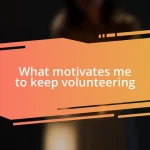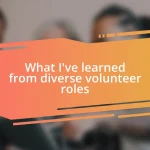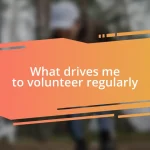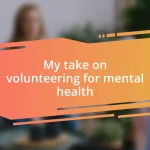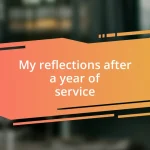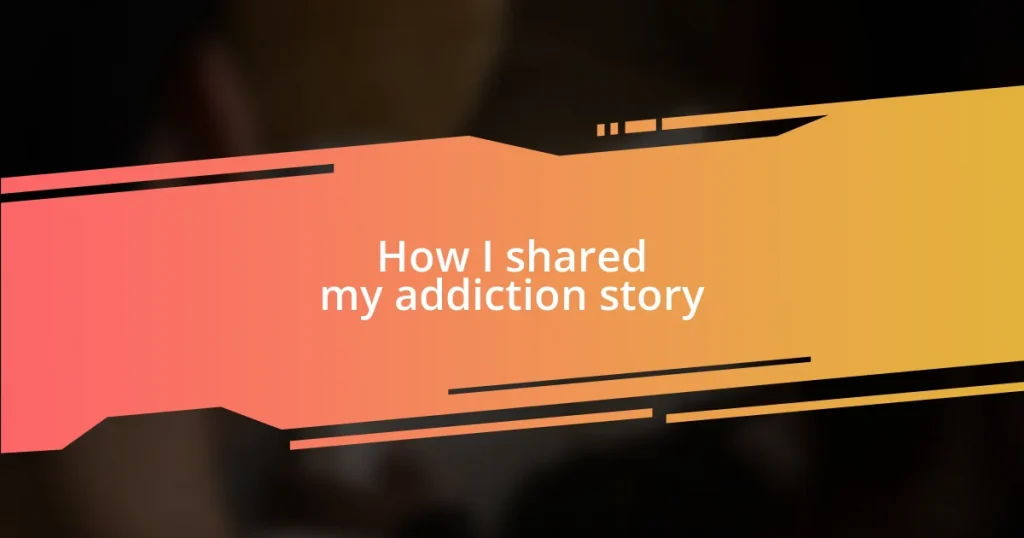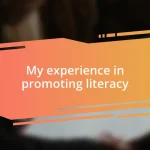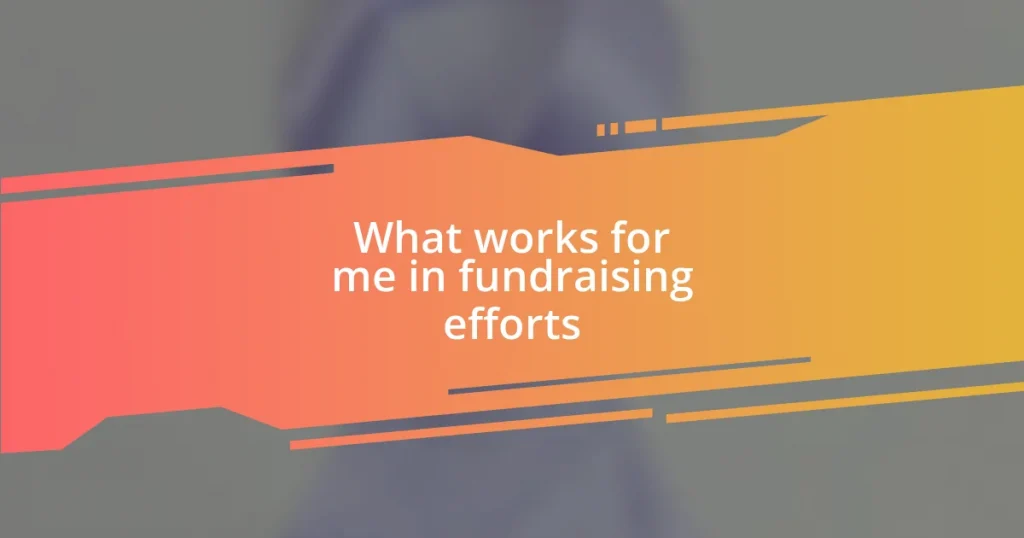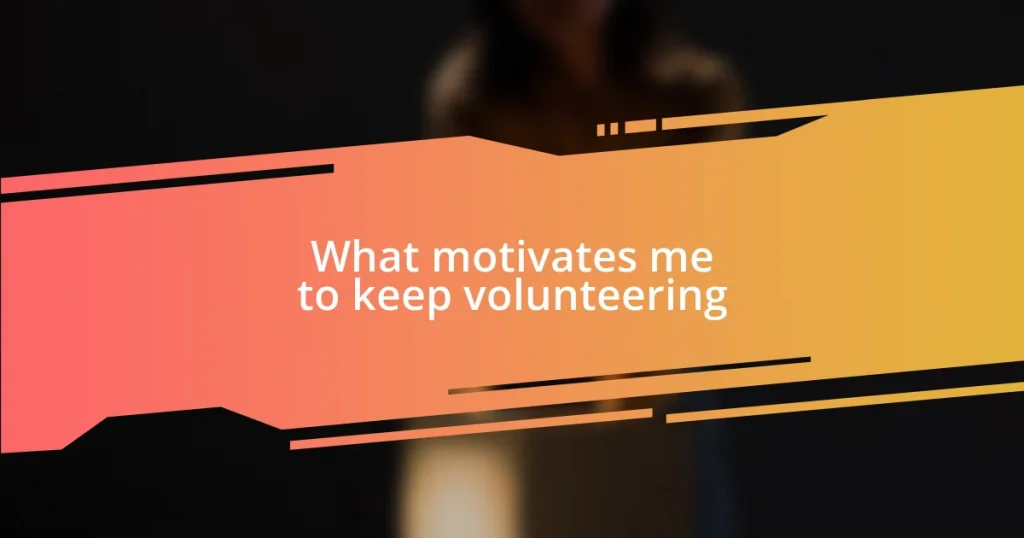Key takeaways:
- Understanding addiction as a coping mechanism reveals deeper emotional wounds and transforms one’s narrative from shame to resilient growth.
- Sharing personal stories fosters connection and healing, allowing vulnerability to inspire and resonate with others battling similar struggles.
- Engaging with audiences through authentic narratives and visual storytelling enhances empathy and creates supportive communities, ultimately inspiring change.
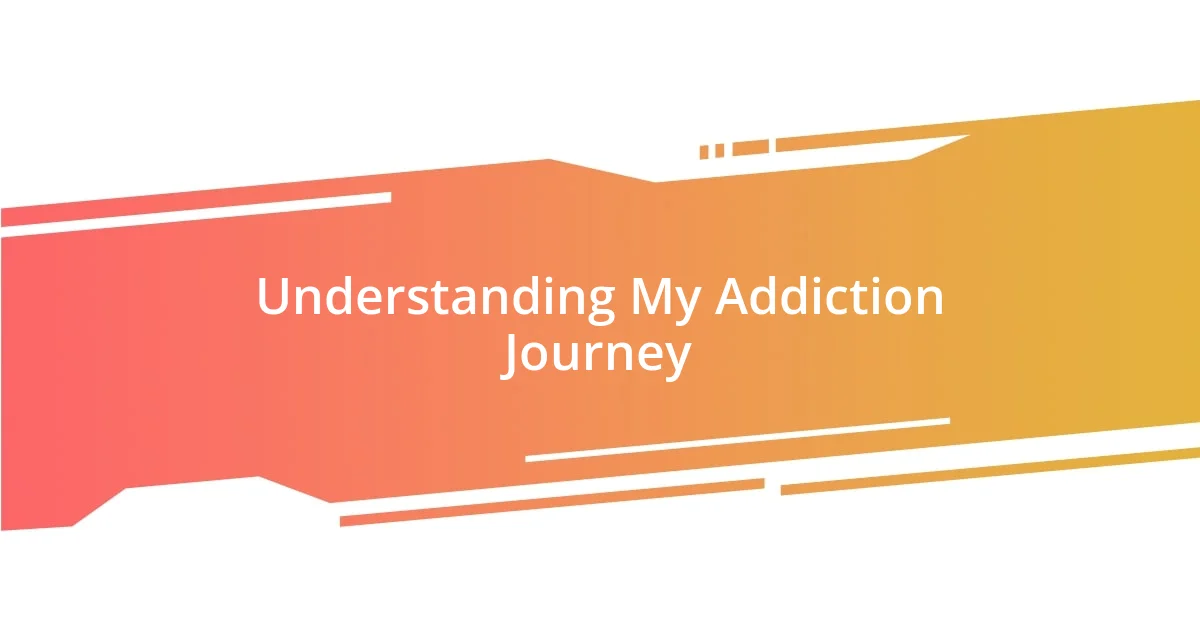
Understanding My Addiction Journey
Understanding my addiction journey has been like peeling back layers of an onion—each layer revealing something deeper and often more painful than I anticipated. I remember the night I hit rock bottom, feeling utterly lost and questioning if this was all there was to my life. How did I get here? Those thoughts haunted me as I realized my addiction had become the main character in my story, overshadowing everything else.
As I began to explore my relationship with substances, I discovered that my addiction wasn’t just about using drugs or alcohol; it was a coping mechanism for deeper emotional wounds. I often think back to the times when I sought solace in a bottle or a pill instead of facing my underlying feelings. Have you ever tried to mask your pain with something that ultimately only made it worse? I found that this moment of reflection was crucial in understanding my addiction—not as a singular event but as a complex interplay of choices, emotions, and circumstances.
Every setback and small victory along the way felt significant, like stepping stones in a stream. One day, I sat down and penned a letter to my younger self, acknowledging the struggles I faced and the choices I made with compassion. I realized gratitude was a powerful tool on this journey. Feeling grateful for the lessons I’ve learned along the way has granted me a new perspective, transforming my narrative from one of shame to one of resilient growth. How has your own story shaped who you are today? I encourage you to think about it.
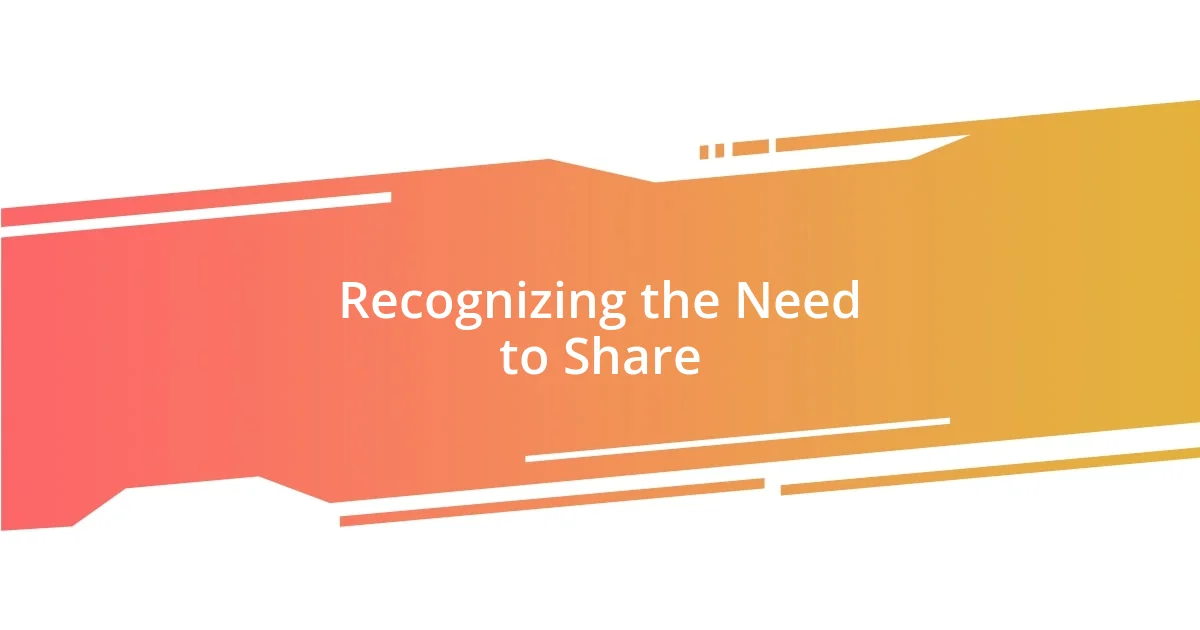
Recognizing the Need to Share
Recognizing the need to share my story was a pivotal moment in my journey. There was a time when I clung tightly to my experiences, believing that vulnerability equated to weakness. I remember sitting with a friend over coffee, feeling the urge to unburden myself. It was during that conversation that I realized sharing my journey could not only lighten my load but might also help someone else feel less alone. Have you ever felt that weight lift when you finally express something you’ve kept inside?
The urge to share grew stronger when I noticed the impact of silence. I would listen to others struggle with their own battles, and I couldn’t help but think that my story could resonate. It was a revelation for me: by opening up, I could foster connection and maybe even inspire someone on a similar path. I can recall a moment at a support group, where I shared my experience for the first time, and the palpable relief in the room reminded me that we are all craving connection and understanding.
In this process, I’ve come to understand that sharing isn’t just about recounting my trials; it’s also about sparking conversations that matter. It felt empowering to transform my pain into a source of strength and hope. Each story has the potential to build bridges and create a sense of community. Have you ever considered how your own experiences could light the way for others?
| Perspective | Outcome |
|---|---|
| Keeping it Inside | Isolation and Burden |
| Sharing with Others | Connection and Healing |
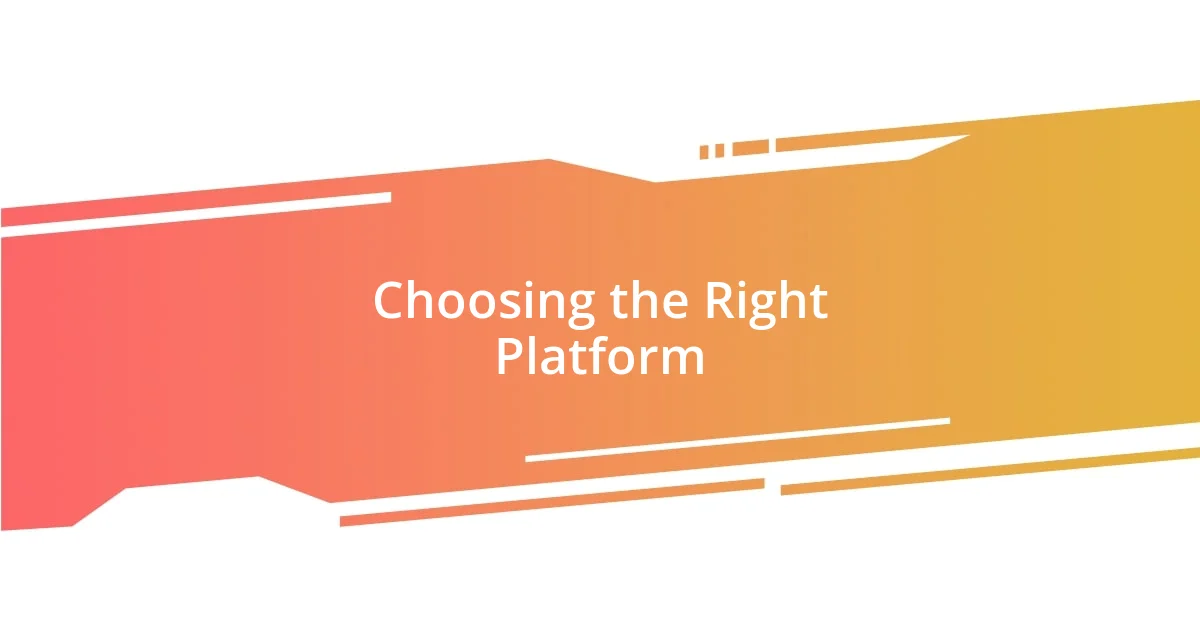
Choosing the Right Platform
Choosing the right platform to share your addiction story can be a transformative decision. I remember when I first contemplated where to voice my experiences. The range of options felt overwhelming, yet I knew it was essential to choose a place where I felt safe and heard. I ultimately gravitated toward online support groups and social media, where I found communities that resonated with my journey. The emotional support I received from sharing in those spaces reminded me of how impactful honesty can be.
When selecting a platform, consider these factors:
- Audience: Who do you want to reach? Are you looking to connect with fellow survivors, loved ones, or allies in recovery?
- Format: Do you prefer written stories, live videos, or even podcasts? Each format offers different levels of engagement.
- Safety: Ensure that the platform feels secure and that your privacy is respected. This can help you share without the fear of judgment.
- Accessibility: Choose a platform that’s easy for you to navigate and engage with. The easier it is, the more likely you are to share consistently.
- Community Support: Look for spaces where you can not only share but also receive encouragement and mentorship from those who have walked similar paths.
Each of these elements plays a significant role in how effectively you share your story and connect with others. I recall being nervous before my first post on social media, but the encouragement I received turned that fear into validation. That experience taught me that the right platform could indeed amplify your voice and foster healing.
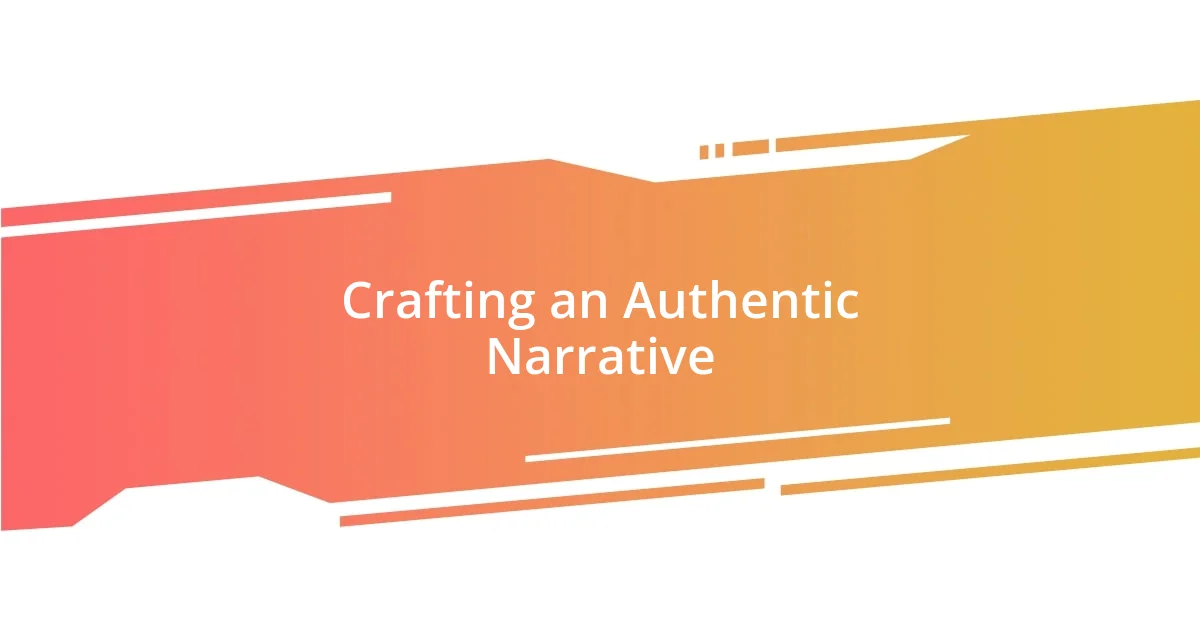
Crafting an Authentic Narrative
Crafting an authentic narrative is about digging deep into your experiences to articulate your truth. I remember the moment I sat down to write my story; it felt like peeling back layers of an onion. Each revelation brought a mix of vulnerability and freedom. Have you ever experienced that feeling when you finally unveil something you’ve hidden for so long? It can be liberating, both for you and your audience.
It’s essential to embrace honesty, even when it feels uncomfortable. I once shared a chapter of my addiction that painted me in a less-than-flattering light, but that moment of rawness sparked an intense connection with the readers. Their responses opened my eyes to the fact that imperfections can resonate more than polished tales. How do you feel about sharing your less-than-perfect moments? In my view, those pieces of our narratives often have the most power.
When I crafted my narrative, I also focused on the emotions tied to my experiences—it’s what makes a story relatable. I vividly recall the rush of anxiety before each public speaking event, followed by waves of relief when I saw heads nodding in understanding. That feedback fueled my confidence and reminded me: our stories are not just about us; they’re a reflection of the human experience. Do you remember a time when someone else’s story helped you see your own journey differently? I’ve found that embracing this shared humanity is what truly makes our narratives authentic.
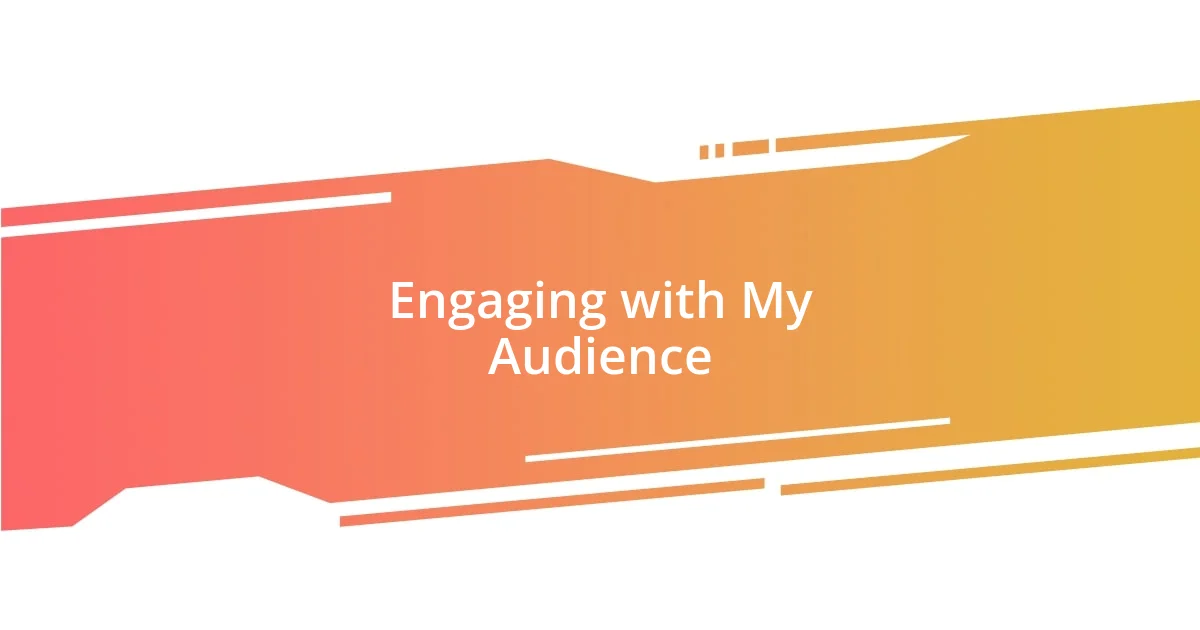
Engaging with My Audience
Engaging with my audience has been an immensely rewarding process. I distinctly remember how, during one of my early shares, I asked a simple question, “How has addiction shaped your relationships?” The flood of responses was eye-opening; it was like opening a door to a room filled with voices that echoed my own struggles. Isn’t it fascinating how a single question can foster such connection and dialogue?
I’ve learned that vulnerability invites vulnerability. When I opened up about struggling on particularly hard days, I was met with genuine responses that mirrored my feelings. One individual even shared their own story of battling loneliness in recovery, and that moment sparked an online friendship I cherish. Isn’t it amazing how sharing our lows can uplift others? I find that every time I lay bare my truths, I’m met with a comforting reminder that we’re in this together.
Another powerful tactic I’ve embraced is storytelling through visuals. I recall posting a candid photo of myself on a tough day, accompanied by a heartfelt caption. The outpouring of support was overwhelming and illustrated just how much images can resonate emotionally. Have you ever felt a connection with an image in a way that words alone couldn’t capture? That experience taught me the value of marrying visuals with narratives to deepen engagement. It’s an ongoing reminder that our stories resonate best when we invite others into our world, creating an atmosphere of empathy and shared understanding.
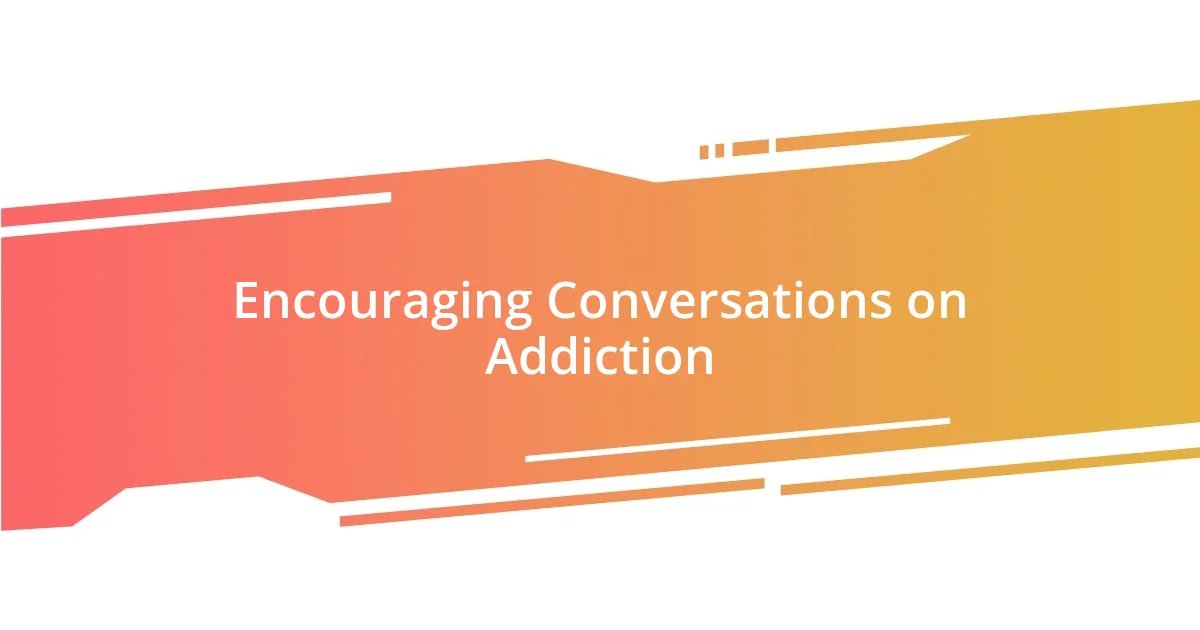
Encouraging Conversations on Addiction
Encouraging conversations about addiction starts with creating a safe space. I remember attending a support group where everyone shared their stories without judgment. It was remarkable to see how open dialogue blossomed when people felt secure to express their feelings. Have you ever participated in a discussion where you felt completely at ease to be vulnerable? Those moments are transformational and can break down the isolation that often accompanies addiction.
In my experience, it’s also about asking the right questions. Once, after sharing my journey, someone asked, “What has been the hardest lesson you’ve learned?” This question not only allowed me to reflect and share a pivotal moment but invited others to ponder their own struggles. I was amazed at the depth of conversation that followed. Isn’t it incredible how one thoughtful question can propel an entire dialogue forward?
Additionally, I’ve found that incorporating storytelling into these conversations can be a powerful tool. I vividly recall sharing a story about a day when I almost relapsed. The vulnerability I felt was daunting, but it opened doors for others to share similar struggles. It reinforced my belief that our stories, intertwined with struggle and triumph, allow us to connect deeply. Have you ever witnessed how a personal story can spark a candid exchange? That’s the beauty of honest dialogue—it cultivates empathy and understanding that can bridge gaps and bring us closer together.
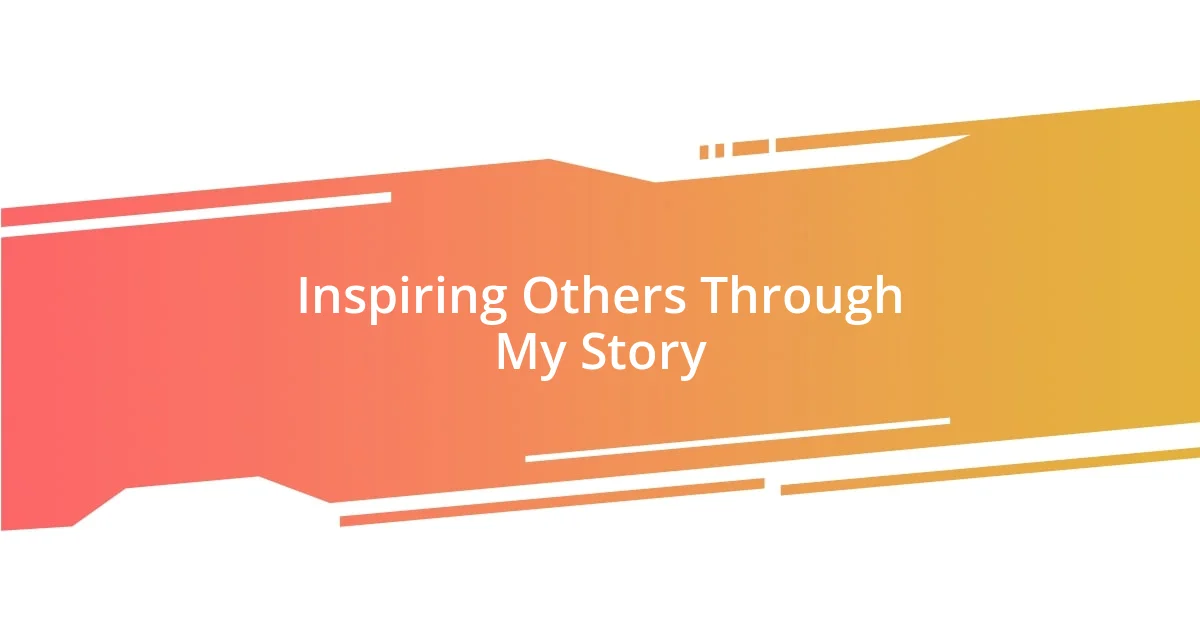
Inspiring Others Through My Story
Sharing my addiction story has been a journey of transformation, not just for me but for others as well. I remember a time when I confessed my struggles publicly, and a stranger reached out to say that my words gave them hope. It struck me how my experiences could resonate and inspire someone to seek change in their own life. Have you ever experienced the power of your own story to uplift someone else? It’s a beautiful reminder that our truths can serve not just as personal healing but as a beacon for those in darkness.
I’ve also realized that inspiration often comes in unexpected ways. During a discussion at a community event, I shared a particular rough patch, detailing how I managed to turn it around. The feedback was astonishing; several attendees approached me afterward, saying my story mirrored their own battles. It brings me to wonder, how often do we underestimate the influence of our personal narrative? Each of us holds a unique key that can unlock someone else’s potential, offering encouragement where none was previously found.
What I’ve found particularly moving is that these interactions create a ripple effect. For instance, after sharing my journey online, a fellow recoverer started their own blog detailing their path. Knowing that my story played a role in their decision to open up fills me with gratitude. Have you ever thought about how far-reaching the impact of sharing your story can be? It’s a profound realization that our voices can create a community, lifting one another as we navigate the complexities of recovery and beyond.


